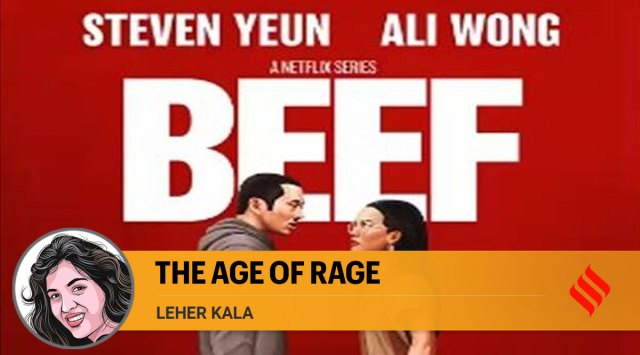
I recently watched Beef on Netflix, a bitter, dark comedy about simmering rage that escalates to create disastrous upheavals in the protagonists’ lives. The messaging resonates because it highlights the mundane but painful aspects of existence, pointing to a hard truth, that anger is the defining emotion of our times. Beef (in colloquial terms, to have an issue with someone) doesn’t sway the sentimental Hollywood way; there is no resolution or great moment of clarity, of characters troubling themselves to reflect that dust we are, and to dust we must return. Instead, it showcases, quite dramatically, how everybody’s on edge gritting their teeth, barely holding it together — while notable memes like Keep Calm and Carry On and Live Laugh Love mock us from the background.
To state the obvious, the world is getting angrier. Every newspaper was carrying this story about how a woman in Delhi battered her mother-in-law to death with a frying pan and then calmly washed it clean in the kitchen sink.
In a wiser society, we’d study anger as a subject at school along with Geography and Algebra. Chances are, it would turn out to be a far more useful lesson; certainly, one that would be put to use every day. Modern psychologists are at pains to tell us “venting” is healthy, that all emotions must be embraced and frustration can be a “transforming force” for good. Of course, anger serves a purpose; abiding fury guillotined cruel monarchs and vanquished czars, even spurred revolutions. In our daily lives, anger acts as a show of strength in front of adversaries, that one is not a pushover. From a philosophical and religious perspective though, it gets a bad rap. Christian teachings define uncontrolled wrath as a cardinal sin, a surefire route to self destruction. Almost all of the Mahabharata is an all-devouring reaction to perceived humiliations; sure, dharma wins in the end but it’s a questionable victory since there’s virtually no one left alive by then.
Perhaps, one may derive solace from knowing how perfectly natural toxic thoughts of petty vengeance are, well documented as plaguing mankind, since Biblical times. Nothing’s changed. Alas, till science delivers an “equanimity” pill, we’re stuck making sense of the frustrations that come with being alive.
It’s a widely held belief that adversity teaches important lessons but currently it feels that the breathtaking pace of life, far from building character, is driving people crazy. The shootings in the US feel like a desperate cry for help from the shooter as well — like it’s a country full of lonely misanthropes trapped in a wasteland of existential emptiness. Society functions on the premise that the wretchedness of our own lives notwithstanding, cannot be the limit of our vision –learning to manage distress is a critical skill to survive adulthood.
Yet, for everybody, it can be hard to gauge where the tipping point to explosion lies, exactly, and Beef hits at the root of our contradictory and fragile natures.
“I hate pretending I don’t hate things,” confesses one of the small array of utterly dislikable characters, caught in the conundrum so many of us are, that we should be trying to be better versions of ourselves, all the time. Maybe, a better approach would be a sobering acknowledgment that when hovering constantly between fight and flight, anything can happen.
The writer is director, Hutkay Films